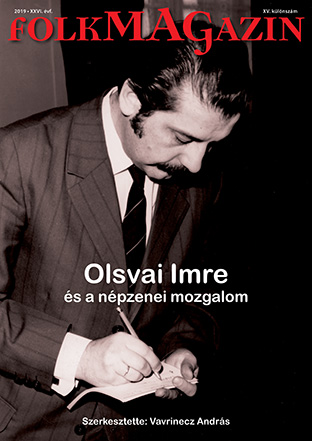Articles by Initial Letters
Ajánlás
- Issue: 2019/x
- Starting page: 3
- Author: Berán István
- =>
Foreward by Berán István - excerpt translated:
"Olsvai Imre was first of all a folk music researcher who remained connected with a thousand links to the various branches of Hungary’s folk music movement; be that folk song circles, zither bands, or musicians and soloists testing their wings in the dance houses. As a student of Kodály Zoltán he was the living continuance, forming a personal bridge between the Master and those born later on.
He taught generations of folk musicians at workshops organized by ’the Institute’ [of Musicology] and others, and at a great variety of folk music camps, or workshops held at educational institutions. Sometimes his teaching work took precedence over his research work within the framework of the Hungarian Institute of Musicology. He always made time to sit on juries of folk music contests and other events rating folk music proficiency. He was there from the beginning reviewing the applications for the National Dance House Festival folk music recordings and rating applicants for the title of Young Masters of Folk Arts. He was a jury member on Hungarian Television’s folk music competition in 1990. He gave lectures on issues affecting the folk music movement, providing perspective and overview of context based on his considerable experience with ethnographic informants in the field, folk music phenomena and personalities.”
"Olsvai Imre was first of all a folk music researcher who remained connected with a thousand links to the various branches of Hungary’s folk music movement; be that folk song circles, zither bands, or musicians and soloists testing their wings in the dance houses. As a student of Kodály Zoltán he was the living continuance, forming a personal bridge between the Master and those born later on.
He taught generations of folk musicians at workshops organized by ’the Institute’ [of Musicology] and others, and at a great variety of folk music camps, or workshops held at educational institutions. Sometimes his teaching work took precedence over his research work within the framework of the Hungarian Institute of Musicology. He always made time to sit on juries of folk music contests and other events rating folk music proficiency. He was there from the beginning reviewing the applications for the National Dance House Festival folk music recordings and rating applicants for the title of Young Masters of Folk Arts. He was a jury member on Hungarian Television’s folk music competition in 1990. He gave lectures on issues affecting the folk music movement, providing perspective and overview of context based on his considerable experience with ethnographic informants in the field, folk music phenomena and personalities.”





